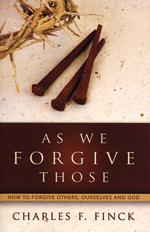|
Parting Shots: Forgiving Its for your own good
3/27/2013
By Josh Johnson
Splash Staff Column
 FINCK |
I remember thinking two things: 1. What a tremendously difficult thing to do. 2. Why in the world would someone do that?
Today, Finck has completed another major milestone: writing and publishing his first book at age 68. "As We Forgive Those: How to Forgive Others, Ourselves and God," is the result of 28 years of counseling and teaching on the subject.
Ah, forgiving. It's a sticky topic, and it surfaces in many of us two familiar thoughts: 1. What a tremendously difficult thing to do. 2. Why in the world would someone do that?
I recently visited with Finck at his Liberty Cross Ministries office in the Liberty Lake Portal to learn more about how his book addresses - and truly embraces -the topic of forgiving someone.
Q: You're an Ironman, so you're familiar with efforts of endurance. I'm guessing writing a book would be a similar feat with a similar sense of accomplishment?
A: It was five years in the making, and it was taken from 28 years of counseling. I'm a Christian marriage and family counselor, and one of the basic principles of healing is forgiving. There are three primary - forgiving, confessing, repenting - and they're really all important, but forgiving is so primary. And I've counseled thousands and run into very few that know how.
Q: It seems like something that would be easier to grasp conceptually than to practice.
A: There's a quote in the book from C.S. Lewis, it's on the back cover, and he says, "Everyone thinks forgiveness is a lovely idea until they have something to forgive." That's what I run into is people who come to counseling, they want help. When you recognize that hurt or pain - which we all experience and I can't stop that from happening - tempts most of us to form some type of judgment, some type of resentment or bitterness. And the healing process for that is to forgive people when we are hurt or wounded.
 |
| IF YOU GO ... Charlie Finck will be reading from and signing copies of "As We Forgive Those" at 7 p.m. April 4 and 11 a.m. April 5 at the Liberty Lake Municipal Library, 23123 E. Mission Ave. Copies of the book, which are $12.95, may be purchased at that time. They are also available at Auntie's Bookstore (Spokane), the Sower Bible Bookstore (Coeur d'Alene) or through amazon.com. For more: www.forgivingprayer.com or 255-9244 |
Q: Do you find that people have a certain sense of justice that makes it hard for them to forgive because they feel the person doesn't deserve it?
A: You just hit one of the nails on the head. We are a people of balance; we are a people of justice; we are a people of fairness and what's right.
I just talked to a lady this weekend whose father was injured terribly in a car accident by a gentleman who was drunk and had a DUI the month before. Her family was so angry and resentful and bitter at the community, the government, the police force for not stopping this, for not putting him in jail before. And at (the drunk driver). And so do we forgive? Well, yes. Otherwise, their lives will be destroyed by bitterness and judgment. And this guy doesn't know whether you've forgiven him or not. This guy doesn't care if you're resentful or bitter.
There are so many different examples like that where we appropriately identify that we've been hurt or transgressed against. It happens all the time. It could be simple: You're driving down the road, and some guy cuts you off. What are you going to do? Does anyone think of forgiving? No. Well, that anger or resentment or bitterness stores in us, and it hurts us, and it hurts those around us.
One of the primary Scriptures I refer to throughout the book is Hebrews 12:15, and it says, "Don't let any bitter root spring forth hurting you and defiling those around you." And judgment, resentment and bitterness are bitter roots. Bitter roots are not the hurtful things that happen to us, they are the sinful responses to the hurtful things that happen to us. We all get hurt often. But how do we respond?
Q: Just to push this discussion a little further: Doesn't it sometimes seem like by forgiving we are giving the offender a pass?
A: As a matter of fact, we forgive because we identify that there has been a transgression, that there has been a trespass, that there has been something done to us. So we're saying, "This hurt me, and I need to forgive this person so that I don't build judgment in my heart."
But do I now have to accept their behavior? Of course not. If someone shoots me in the leg, I want to forgive him, but I'm not going to let him shoot me in the leg again. As a matter of fact, as we forgive, we learn to set more appropriate boundaries, and that makes a world of difference.
Q: The subtitle of your book refers to forgiving God. What do you mean by that?
A: Let me clarify "forgiving God" a little bit. It doesn't mean God has sinned against us or trespassed against us. It means that we judge God.
I counseled a woman who lost a son quite a few years ago. He was 17 or 18 years old, coming home from a basketball game in the middle of winter. He hit some ice, slid into a tree and went through the windshield.
Her terrible cry was, "How could God have let this happen?" She was angry at God. She said to me, "He was a good boy. Why did God take him out?" And you could see she was terribly hurt, and wherever there is a hurt or a wound there is usually some anger or bitterness.
And so her question was a good one: How could this have happened? Well, it's physics - friction, ice, inertia, speed, immovable object like a tree. But that's not what she needed to hear. She needed to hear how terrible it was and how sad it was and how grieved it was. And that's where we spent our time. Then at some point I asked her if she would be willing to forgive God, and the prayer really reveals what that means: Giving up any judgment she might have had for God.
Gosh, we blame God for the weather, how we look, our financial situations, for all kinds of things. Isn't it appropriate to forgive him if forgiving means giving permission to not judge, not blame? It's somewhat provocative to "forgive" God if we don't understand what it means. It doesn't mean God has sinned against us; it means we've judged him.
Q: That's an element of forgiveness we don't often think about - in a sense, forgiving for our own perception, right or wrong, of feeling trespassed against.
A: It is. It's an unspoken, like, really, forgive God? Well, have you blamed him? Then you need to forgive him.
When I ask people what it means to forgive, very few people have a definition for it. The closest some will come is "well, it's releasing someone." And it is, it's a releasing of the judgment, not holding it against, and those are the words we have used in the prayer.
Q: The book is built around this "forgiving prayer" and is coming out just before Easter. Seems like strategic timing.
A: I had originally hoped to get it out before Christmas, but it just takes time. And then I thought, "This is perfect." I started advertising a week or so before it came out and made a little sign for a ministry conference I was at that said "Easter=forgiving."
I distinguish between forgiveness and forgiving. When people think of forgiveness, they think mostly of how we are forgiven by Christ's act on the cross. This book is not about that. This book is about us learning to forgive because of what Jesus did on the cross. So I don't use the term "forgiveness" as much, just for clarity. Because if you say to someone, "describe forgiving for me," it's easier for them to own it. ...
There are three primary reasons to forgive that I have found. The first, scripturally, would be to be obedient because God tells us to forgive. The second would be to identify with Christ on the cross his sacrifice and humility. When we forgive, we are being sacrificial and we are humbled, and that's the connection with Christ on the cross. But the third is we forgive to be healed.
Josh Johnson is editor and publisher of The Splash. Write to him at josh@libertylakesplash.com.


